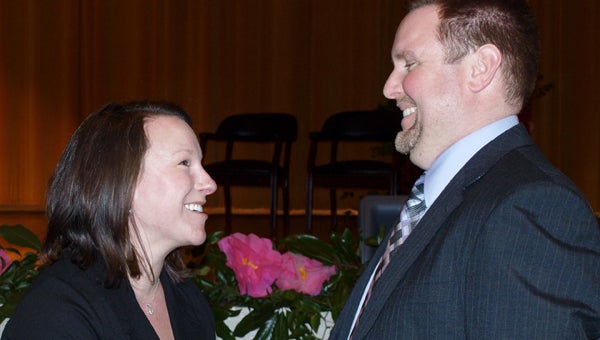Visiting Roby talks education
Published 3:22 pm Tuesday, February 8, 2011

Martha Roby, U.S. Congressional Representative for the 2nd District, chats with Greenville High School Principal Brad Cook following her visit to the high school Friday. Roby visited several classrooms before talking to interested educators and parents in an assembly following her tour, allowing time for a Q & A session. Roby says she plans to visit every high school in her district in order to get feedback from teachers on the challenges facing education. (Advocate Staff, Angie Long)
U.S. Representative Martha Roby of the 2nd Congressional District got a lesson in the concerns facing parents and teachers in Butler County last week.
On Friday, Roby, who took office January 3, visited Greenville High School, where she toured the facilities, heard a performance by the GHS Tiger Band, and held a Q&A session.
Roby, a Republican who serves on the House Armed Services, Ag and Education and Work Force Committees, said she is particularly interested in listening “to the people who are teaching our children.”
Roby decried the heavy involvement of the federal government, lacking of funding for programs and “Washington bureaucrats” in the state’s educational system.
“I believe you are in the best position to know what is best in educating your children . . . we need to look at ways we can get monies back into the hands of local educators, superintendents, school board members and parents. That is my philosophy,” Roby, the mother of a kindergarten student in Montgomery County, said.
Roby was questioned about government bureaucracy and the endless amount of paperwork required by the U.S. Department of Education.
“You know, there was a time when the U.S. Department of Education didn’t even exist,” said Roby. “I know you work hard every single day to teach in your classrooms, but the federal government is getting in the way.”
Parent Laura Hartman Fuller stated she felt her four children had been shortchanged through No Child Left Behind and would like to see it abolished.
“I have sympathy for the children who are struggling, believe me, but I also know my children are not being taught to their ability. They should not be held back,” said Fuller.
“Let me encourage you and say this, we will take up the issue and see what rewriting NCLB looks like . . . we need more parents like you willing to get involved and hold them accountable. I am on the Early Childhood Sub-Committee which will give me some truly hands-on opportunities when it comes to NCLB,” Roby said.
Paige Barr, a former elementary teacher who currently serves as a reading coach at GHS, said she was concerned programs such as DIBELS, while being well intentioned, gives students the erroneous belief speed reading equates with good reading.
“Many of our students lack good reading comprehension skills. We know these skills have to come from the start, and somehow, in the middle, we are losing them when they go through these life changes. They are more resistant to instruction, classes are overcrowded,” Barr said.
“To me, it would make more sense to have smaller classes that are ability grouped. Right now, we have classes with more than 30 kids. We have special education students reading on a second or third grade level, but who are in the same classes as general education students. This is so stressful for our collaborative teachers.”
Barr added some special needs students who were in reading remediation classes had been removed by their parents because they had “done well enough in their classes previously.”
“But the problem is, if you can only read on this (2nd or 3rd grade) level, you can’t pass the graduation exam,” she said.
“We also want these children to be ready and able to enter the workforce, and yet Career Tech programs that would help keep losing funds.”
GHS faculty members said mainstreaming of special education students had benefited them in terms of improved socialization skills with other general education students, but suggested a mixture of mainstreaming and ability grouping could better benefit both populations.
“I agree. We need to teach our children where they are at and I certainly understand the need for more tech classes in our high schools. We have such a great two-year college system in our state; we want our children to be prepared for it,” said Roby.
Spanish teacher Lisa Huggins addressed the issue of over-crowded classrooms. “I teach 171 students in a day, with two classes with 35 students. You don’t want anyone to fall through the cracks, but I know I am not being as effective as I could be. With no teacher money as well-we as teachers feel like we’ve been hung out to dry,” Huggins said.
Roby said Governor Bentley had “an incredible task” ahead of him with proration continuing.
“Typically they look at cutting teachers and increasing class size-and we know you can’t do that. I do want to thank you for the sacrifices that you make. Let’s keep this as an ongoing conversation, because I do want to hear from you.”
Roby gave her web address, http://roby.house.gov which includes additional contact information for the congresswoman.





